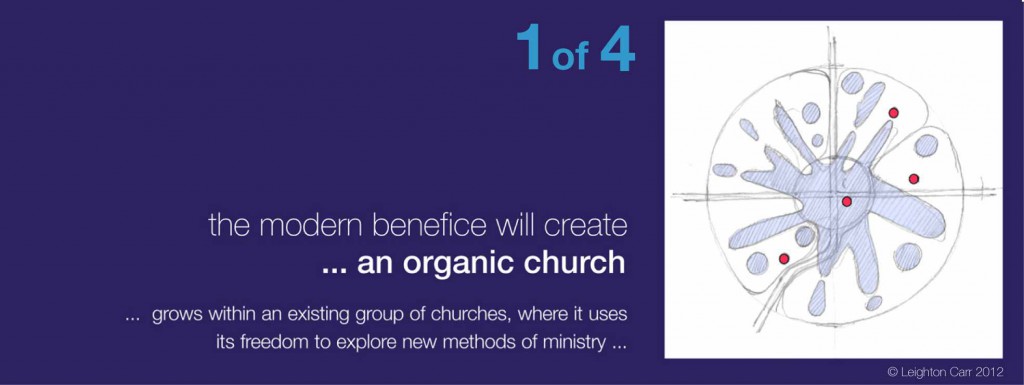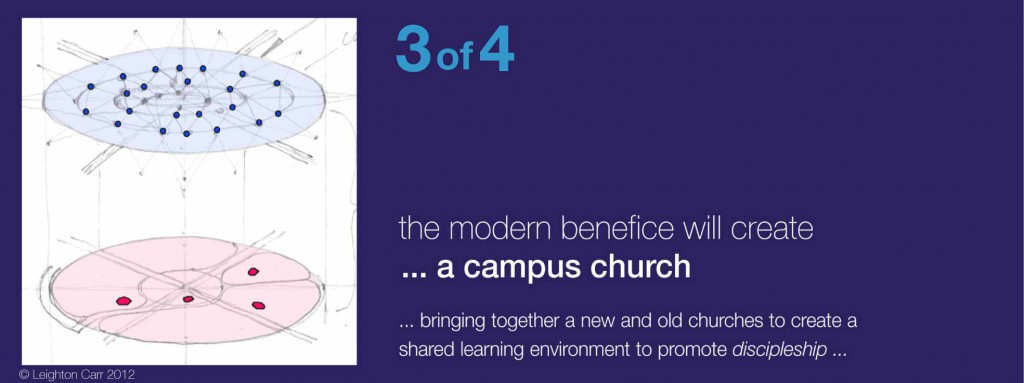The successful modern benefice in the Church of England will need to become a Campus. This means it will draw together resources for teaching, mentoring, coaching and training, for the purpose of helping Christians deepen their discipleship and witness. Lay ministers will need to work in a more flexible way, working in teams, with each person working to their strength, be it research, writing, preaching, coaching. The Campus church will also attract external resources from outside the Anglican church – theologians and educators – as well as offer resources to all local colleges and schools (not only Church of England schools!) to build up the life of society as a whole.\r\n\r\nThis is 3 of 4: see the whole poster go here\r\n\r\nOr see each individual post here: 1-Organic 2-Networked 4-Planting\r\n
Category: creatively re-imagining church
The successful modern Church of England benefice 2 – Networked
A successful modern Church of England benefice will need to be Networked. That is, it will need to work across churches of different styles, theology and history, and across parish boundaries. Networked churches will make the most of resources, limiting duplication to maximise effectiveness and sustainability. To create and environment for sustainable growth the successful benefice will draw on the expertise of many people wherever they are found, in Anglican churches and others.\r\n\r\nThis is two of four: see the whole poster go here\r\n\r\nOr see each individual post here: 1-Organic 3-Campus 4-Planting\r\n\r\n \r\n\r\n
\r\n\r\n
- The Networked Benefice
The successful modern Church of England benefice 1 – Organic
A successful modern Church of England benefice will need to be Organic. That is, it will need to grow and flex within existing and new areas – geographically, physically, theologically and socially. Rigid strategies won’t cut it. Leaders will have to be creative and articulate, the people they lead will need to be patient and forgiving – and more involved! All will have to be totally committed to making it work if it is to grow. This has not been the Church of England way in recent times, but if it is survive into an uncertain future then traditional Anglican sensibilities will have to be challenged.\r\n\r\nThis is 1 of 4: see the whole poster go here\r\n\r\nOr see each individual post here: 2-Networked 3-Campus 4-Planting\r\n\r\n \r\n\r\n
\r\n\r\n
- The Successful Modern Benefice is … Organic
A Sofa called The Beast
We have an enormous sofa. We call it The Beast.\r\n\r\nIt’s a Tetrad four person sofa that only fits in one place in the room – in front of the radiator. It’s so big it absorbs probably three quarters of all heat emitted.\r\n\r\nWhich should make it great to sit on. Hot and Big.\r\n\r\nBut no. It’s too deep to sit on without tucking legs and feet on the cushions. Imagine a sofa larger than a single bed. And the cushions are so big that people don’t sit on them as much as climb into them, and it’s hard to see out, let alone get out, once in there. And of course guests feel uncomfortable sitting without their feet on the floor.\r\n\r\nWe bought it as part of a three sofa strategy developed to allow at least nine people to sit comfortably in the room.\r\n\r\nWhy? I really can’t remember. It was something to do with growing a church.\r\n\r\nSo we have a very big sofa.\r\nGuests don’t want to sit on it\r\nThe room is cold.\r\nAnd we never have nine people in the room at the same time.\r\n\r\nWhich made us think, if buying the sofa didn’t bring people in, maybe if we got rid of the sofa we’d have more people over?\r\n\r\nWe paused for a moment.\r\n\r\nWhen spoken out loud that sounded as farcical as the weekly Sunday conversation about removing the pews in church.\r\n\r\nAs if removing the pews would grow the church …
Why are there so few APEs in church?
APEs.\r\n\r\nApostles. Prophets. Evangelists.\r\n\r\nWhere are they?\r\nWhy so few?\r\nWhy is the leadership of the local church almost entirely in the hands of Pastor/Teachers?\r\n\r\nHere are three possible reasons:\r\n\r\nFirst, the Trustees of the institutional denominations (generally) don’t trust APEs with the established church, and they prefer to install Pastors/Teachers.\r\n\r\nSecond, the Pastors installed in the local church (generally) can’t lead APEs, being focused as they are on ensuring the wellbeing of the Ordinary Church Member.\r\n\r\nThird, the Ordinary Church Member is (generally) afraid of APEs and would rather be left alone with their Pastors and Teachers to grow in peace.\r\n\r\nFar fetched? Maybe not.\r\n\r\nThe word that is perhaps at the root of this issue is ‘Trustee’.\r\n\r\nAt a deep level this word ‘Trustee’ has come to define much of our understanding of what a good church leader should be at all levels of church life, lay and ordained.\r\n\r\nThat’s fine and right. Church leaders must not be careless.\r\n\r\nBut to be balanced we need to remember that we are Trustees of the Gospel as well as Trustees of the Church. We were given this trust of a Gospel to proclaim by Jesus himself.\r\n\r\nAnd Jesus kept the church for himself. His Bride, not ours. And we should give him credit that he’s managed the church quite well for 2,000 years often in spite of our efforts.\r\n\r\nOf course, identifying people by their gifts in this simplistic way is exclusive and somewhat debilitating. The messy human reality is that each of us has a mix of gifts, wisdom, experience, skills, beliefs and connections and it is out of this humanness that the church can flourish and grow by the leading of the Spirit.\r\n\r\nAnd APEs need to be better. Better at being careful, better at being led, and better at communicating to the wider church.\r\n\r\nThat being said, it should still be a matter of great concern that so few leaders, and even fewer Ordinary Church Members, seem to have been given the permission to stir up the necessary gifts within them to create a vibrant, Holy Spirit inspired, resurrection energised, culture challenging, life enhancing and dynamic church.
Frontline Staff
We’ve got it wrong.\r\n\r\nIt’s not the clergy who are on the frontline, but Ordinary Church Members.\r\n\r\nIt’s the Ordinary Church Member who has to go out into the marketplace and be the light of the world.\r\n\r\nIt’s the Ordinary Church Member who has to be at home with difficult decisions about money, complicated spouses and unreasonable children.\r\n\r\nThe clergy staff have the support of fellow clergy, Bishops, other staff members built into their job description. The Ordinary Church Member doesn’t have that support. More often than not they are the only Christian where they work or live, they rarely meet their church leaders and pastors for anything other than a cursory hello, and they rely on brief and inadequate weekend encounters with other Christians at church to receive their encouragement.\r\n\r\nIt’s a misconception to say that the church staff are on the frontline because (for example) they go into a primary school once a month. Generally they are well respected and well accepted in other institutions. They are given a platform, with even a measure of government support in the curriculum.\r\n\r\nNo, like most other large organisations it’s those lower down the chain who are on the frontline, face to face with the public, often with little support, little encouragement, nowhere to turn.\r\n\r\nSo if that’s true, what sort of leaders should we be?\r\n\r\nAnd what sort of churches should our churches be?
Cliff Edge Volunteers
One encouraging fact to come out of the Olympics was this: people like to volunteer.\r\n\r\n240,000 people applied to be Olympic volunteers around London, of which only 70,000 (ONLY 70,000!) were chosen.\r\n\r\nThe National Trust runs with the help of over 60,000 volunteers.\r\n\r\nAnd yet, most churches are struggling to get hold of volunteers.\r\n\r\nBut then, most churches don’t have anything as exciting as the Olympics to offer (although we have plenty of old buildings we may end up giving to the National Trust). We may bandy about statements about the worthiness of the church, but the reality is that most churches are dull and introverted organisations. We are creating proportionally more bureaucracy to serve fewer people in dwindling congregations. The opportunity to serve as a volunteer in church now seems to be propping up creaking structures that should by all other measures be disbanded.\r\n\r\nAnd that is of little or no interest to most people under forty, let alone those under twenty.\r\n\r\nLeaving aside the lack of opportunities for meaningful engagement in church, selecting the right person for the right job in church is not as easy as choosing thousands of volunteers to stand on street corners and point people around London. New volunteers are all very well in principle, but not every volunteer is appropriate for key roles in the church. And those volunteers who are appropriate are rarely available, being already overcommitted on existing committees.\r\n\r\nNo, what we need is a new focus. And perhaps it should be based on Jesus’ own example. We rarely see Jesus cajoling his disciples to volunteer (feeding 5,000 perhaps). Instead we find him commissioning them way before they were ready to leave the comfort and close proximity to the main group and head off by twos into unknown territory to discover the joys of Cliff Edge service.\r\n\r\nFollowing this pattern, we need to create some new Cliff Edges to walk along outside the church.\r\n\r\nIn Sports Clubs.\r\n\r\nIn Media.\r\n\r\nWith the Poor.\r\n\r\nWith the Rich.\r\n\r\nIn the Arts.\r\n\r\nIn Government.\r\n\r\nWith Business.\r\n\r\nWith Money.\r\n\r\nIn Britain.\r\n\r\nIn the world.\r\n\r\nWith Secularists.\r\n\r\nWith faithful others.\r\n\r\nYou name it. No really … you name it!\r\n\r\nLet’s make the business of volunteering for the church deeply meaningful and inherently stretching.\r\n\r\nAnd how?\r\n\r\nLet’s find out what our volunteers can do, what interests them, what gifts God has endowed them with, and what Cliff Edge only they can walk along.\r\n\r\nThen let’s support them – rather than ask them to support us.
When Grandma came to the baptism.
Grandma came to her granddaughter’s baptism.\r\n\r\nThe baptism took place in the same church where Grandma herself had been baptised 72 years before. After her own baptism Grandma had stayed in the church for a short while, encouraged by her faithful parents, but eventually left to discover a more interesting world when she started secondary school.\r\n\r\nSo this was Grandma’s first day back in the church for over sixty years. As she walked out she shook the hand of the vicar and said how pleased she was that nothing seemed to have changed since she was baptised.\r\n\r\nNothing except the names of the people involved.\r\n\r\nAnd that got me thinking.\r\n\r\n72 years. That’s ten Rectors at an average of 7 years each, now on the eleventh, each with a curate, so say eleven curates over 72 years, and let’s say each Rector had an assistant or associate clergy person working in the team, so that’s another eleven clergy, one to help each Rector.\r\n\r\nSo that’s\r\n\r\n11 rectors + 11 curates + 11 associates = 33 clergy …. in 72 years.\r\n\r\n33 clergy. And in 72 years nothing’s changed.\r\n\r\nWhatever else you might observe, you would have to conclude that being a member of the clergy is not about bringing change.
Like Kew Gardens in a Storm
The storms of October 1987 brought devastation to a third of the trees in Kew Gardens. Around 700 trees were uprooted, many of them old (100 – 200 years) and fully mature (100ft).\r\n\r\nSome said that a hundred years of history had been lost.\r\n\r\nOthers noted that for a hundred years too few trees had been planted.\r\n\r\nWhen the staff came to investigate further they found that many of the trees had inadequate root systems. Some very tall trees had root systems that had spread great distances outwards but only one meter downwards.\r\n\r\nAn audit also showed that the pre-storm gardens had gaps in its inventory, that whole species from many countries were missing.\r\n\r\nSo Kew Gardens looked great, but it took a greater storm to develop a planting regime that ensured the garden’s vibrancy and to instigate improved ways to nurture trees.\r\n\r\nI know churches that need this.
A church like a tapas bar.
Set back from pavement on the road that connects the main student accommodation district to the university teaching campus is a small bistro with a front courtyard. The internal bar and rooms and the courtyard are on a slightly lower level than the pavement, which gives it a secluded feel even though it’s on one of the busiest streets in town. I knew it thirty years ago when it used to be called the Tapas Bar, because it served … tapas. And Beer. Both of which I enjoyed as a student.\r\n\r\nIt isn’t called the Tapas Bar anymore, it’s called The Town House, although it still sells tapas and beer.\r\n\r\nTo be more precise, it has the name The Town House on the sign board, although we still call it the Tapas Bar. If ever we want to go there we say, “let’s go to the Tapas Bar.”\r\n\r\nThat’s because it has changed management and names so often that we couldn’t keep up. We all knew it as the Tapas Bar before, so the Tapas Bar it remains.\r\n\r\nOf course this raises an underlying truth about the Tapas Bar (or The Town House) . ‘Under New Management’ may be a statement of fact, but it is never a statement of radical action. Whether or not the new owners ever thought they could really change it, they were never able to other than tinkering with decor and fittings and furniture.\r\n\r\nThis was due I suspect to the fragile balance of the enterprise which goes something like this: change alienates the regulars but attracts new customers; but the regulars leave faster than new customers arrive and settle down to become regulars; this net loss of people jeopardises sustainability.\r\n\r\nConclusion: the formula works as it is, so tinker if you like, but don’t change the essentials unless you want to close up shop due to lack of support.\r\n\r\nThe real problem of course is that customers are fickle. They don’t need to go, and might as well go somewhere else if they aren’t getting what they want. It’s their power that counts. Bums on seats.\r\n\r\nI know churches like that.
